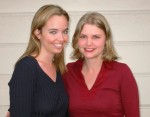Amy Rardin and Jessica O’Toole prioritize creating relatable, female-driven storylines for the TV show “Jane the Virgin.” The storylines unfold from the show’s female-dominated production team.
“It’s a majority female (writer’s) room with one token, straight white male,” O’Toole said. “It’s like the opposite of every other writer’s room in television.”
UCLA Housing will host a panel discussion and Q&A with Rardin and O’Toole, executive producers and writers for The CW comedy series “Jane the Virgin” Tuesday in De Neve auditorium. UCLA Residential Life organized the event after Christopher Hanscom, the faculty-in-residence for Hedrick Hall, mentioned that O’Toole was his friend from college.
The discussion, which will be moderated by UCLA School of Theater, Film and Television associate professor Sean Metzger and assistant professor Kristy Guevara-Flanagan, will focus on how Rardin and O’Toole represent gender and culture in their writing on the show, and how they built their careers as television comedy writers.
The lead characters of “Jane the Virgin” consist of a matriarchy of Latina women: a young woman named Jane, her mother and her grandmother. With a storyline adapted from a Venezuelan telenovela, the show addresses issues like job opportunities and immigration from a Latino perspective.
In season two of the show, Rardin and O’Toole wrote episodes that involved Jane’s experiences with breastfeeding, a topic Rardin said has never really been talked about on television before. The pair said they strive to write about issues that affect women in an honest way, especially given they are issues the women in the writer’s room deal with everyday.
In addition to gender representation, Hanscom wanted to ensure the panel addresses the show’s emphasis on cultural inclusion, especially after the 2016 Academy Award nominations made diversity a hot topic in Hollywood.
“’Jane the Virgin’ is a very good example of what one can do when one represents ethnicity in a predominantly white media context,” Hanscom said.
Metzger, who studies the intersections of gender, sexuality and Asian-American performance, said he plans to ask Rardin and O’Toole how language plays into the show’s cultural dynamic, since the dialogue interchanges between Spanish and English and often uses subtitles.
“There’s going to be a lot of emphasis on what it means (for the writers) and how do you make a successful show that centers on the experiences of, in this case, minority women and not totally English-speaking women,” Metzger said.
When writing about aspects of the show that relate to Latino culture, Rardin and O’Toole are always conscious of the blind spots they might have. They take notes from Latina writers in the room and sometimes even the lead actress Gina Rodriguez about how they can make their portrayal authentic.
Though the panel will discuss the show’s themes of gender and culture, Hanscom also hopes it will serve as an educational event for students interested in pursuing careers in the entertainment industry.
Rardin and O’Toole became friends in their seventh grade drama class, sharing a similar sense of humor and an interest in comedy writing. They moved from their hometown of Reston, Virginia to Los Angeles after graduating from college to pursue careers as screenwriters, knowing barely anybody in the area and little about how to get started in the business.
They hope their stories about their humble beginnings as a screenwriting duo in Hollywood will help aspiring television writers attending the panel.
“It’s a hard business,” O’Toole said. “You need to have a thick skin and persevere through humiliation and failure.”
In discussing Rardin and O’Toole’s personal experiences in the entertainment industry, Metzger hopes the panel will remind students of the impact writers can have on audiences.
“Gender and sexuality are not just things that exist in the world, they are things that are actively produced by media industries. And (“Jane the Virgin”) is a perfect example of how that happens,” Metzger said. “It’s helping not only to reflect issues in society, but to shape them.”
